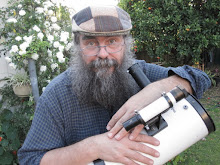Monday, August 13, 2018
Seeing Venus in the daylight, 14-15 August 2018
As regular readers of this blog know, I'm obsessed with seeing Venus in the daytime.
Venus is currently bright enough to see during the daylight. However, finding a bright dot in the vast amount of blue can be challenging. It is easier to locate Venus if there is a handy foreground object nearby to use as reference. The Moon is such an object, fairly easy to spot making it a handy guide.
On the 14th, and then again on the 15th, the crescent Moon is about a hand-span from Venus, an excellent opportunity for finding Venus in the daylight.
Look for the thin crescent Moon, and Venus should be visible as a bright dot just above it (14th) or below it (15th). The images above should help locate it. It's best to look in the afternoon when the Sun is low and the sky is less bright. Make sure the Sun is hidden behind something solid like a building or a wall when you are looking for Venus, not trees or your hand. Exposing your eyes directly to the glare of the Sun can be very dangerous and you could potentially lose your sight.
You may need to use binoculars at first to pick up Venus near the moon, but once you have spotted it it will be obvious (again make sure you practise sun safety when observing with binoculars).
I used a corner of the house and pergola to shut out the Sun and frame the Moon-Venus combination for previous daylight Venus adventures.
You may also use mobile phone apps such as Google sky map to locate the Moon and Venus in the vasty blue.
If you miss this opportunity, locate Venus around half an hour after Sunset, and find a convenient marker (a tree, a telephone pole or something like that) close by to Venus from a fixed position in your yard. Note the relative position of Venus and features on the marker. Next day, go to your viewing position about 5 minutes after Sunset and again note Venus's location. The next day, look 5 minutes before Sunset and note the location. And so on until you can see Venus well before Sunset.
Do remember to be very careful not to look directly at the Sun when doing all of this. Chose your viewing location so that the Sun will be hidden well behind some solid object at all of your projected viewing times.
Good luck Venus hunting.
Labels: Daylight, Daytime, Moon, unaided eye, Venus





 Click to read about or order
Click to read about or order Click to read about or order
Click to read about or order Click to read about or order
Click to read about or order Click to read about or order
Click to read about or order




